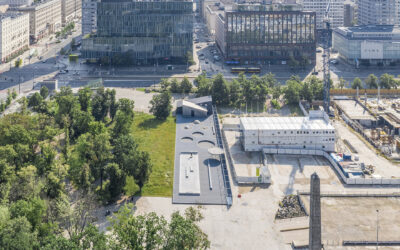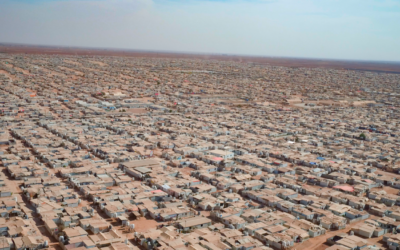
This proposal was made in 2019 by Senada Demirović Habibija/ PhD Arhcitect, Slaven Aničić, Emina Isić, Selma Bijedić, Sulejman Demirović, part of IDEAA Urban House Mostar. IDEAA Urban House is a laboratory that explore the important relationship between design, emotional states, and the real social needs of society; creating a strong link between professional staff in the field of architecture, urbanism, education, art, literature, IT technology, science, sports and citizens activities of these areas in everyday life, regardless of age, gender and life choices.
The project aims to rehabilitate a unique sportsground and its adjacent buildings in the city of Mostar, Bosnia & Herzegovina, a country that between 1992 – 1995 fell victim of a devastating war. This project is named after the sports society that owned it: Partizan in Mostar. Thinking BiH and intends to repurpose its ruins, to turn them once again into a public space for everybody and to represent sports, arts and culture in Mostar.
Today, tensions in politics within the city are the result of ethnic division, faulty physical reconstruction and lack of an effective trust-building process. Such conditions have negative repercussions on the cultural, educational and public life of Mostar and are also due to a lack of public space and facilities.
Within this complex and unique framework, local and international NGOs and individuals are working together to carry out this initiative in sports, recreation, arts and architecture by reactivating a neglected former sportsground.
The site is roughly 2500 smq and sits on high ground on the eastern bank of the Neretva, in a very central position close to the Stari Most. The sportsground and its surroundings were in a rundown state, although huge potential lied in its ruined features. Part of the plot were also buildings that prior to the war were used as offices, changing rooms and other facilities for the sports area.
A set of goals, in terms of physically tangible change, and of objectives, short and long-term effects, which are the expected result of the former, can be defined for the process:
Objectives:
- Reintroduce and expand a former public facility to the city. Be an example for reusing, renewing and restoring historical places in Mostar and the whole of Bosnia and Herzegovina.
- Revitalize Partizan as a society with long-term goals. To improve the involved NGOs’ work and allow it to grow as a focal point for the community.
Bearing in mind Thinking BiH’s set of goals and objectives, its conditions and context, the first event has been a success. Since April 2019, Partizan’s team, with the help of Rustic Pathways, private donations and volounteer work from the community, had been able to clear the superficial but fast-growing vegetation that covered the site and give a fresh new look to Partizan. More than one hundred children from local schools and foreign exchange programs have successfully managed to take part in the activities and have radically changed the site’s appearance and accessibility. These initial cleaning operations then leaded to the first Partizan Party that took place during the last weekend of August 2019.
This is an example of resilience thought as an attempt to give new life to a place that before the war of ’92-’95 was a symbol of public space, shared by everyone regardless of ethnic group or religion and after was abandoned and part of a system of cultural and ethnic division.
Restoring a sportsground can be an act of resilience and political resistence, an important action of re-shaping the city trying to create a better life for the next generations and promoting peace and intercultural coexistence.
Recommended by Beatrice Ricci
Main source: https://www.ideaa-mostar.com/portfolio/green-design-biennale/
Additional sources:
https://futurearchitectureplatform.org/projects/17960187-3668-48da-98c6-56a96d3db1df/








